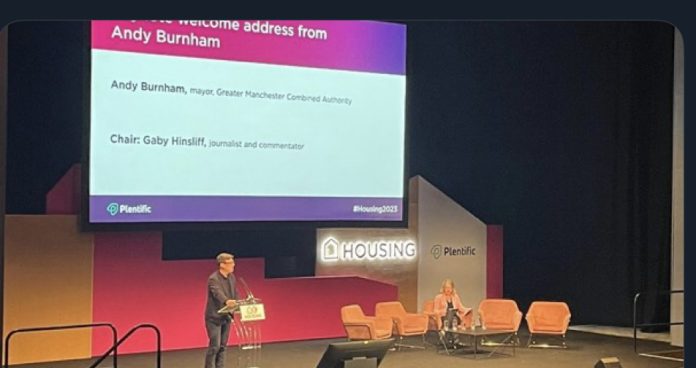Greater Manchester Councils would be to intervene and acquire properties from landlords who are unable or unwilling to meet decency standards under proposals being introduced by the Mayor Andy Burnham today
The proposals will make Greater Manchester the first city-region to bring all rented homes up to the Government’s decent homes standard
Greater Manchester will introduce UK-first Good Landlord Charter to recognise best practice and boost tenant confidence in quality of rental properties
The Mayor will call on the Government to back the city-region with a set of new or enhanced powers and resources, using the framework of the city-region’s trailblazer devolution deal, with the aim of shaping a template for national action on the housing crisis.
The intention would be to bring in the new set of measures in place by autumn 2024, building on the forthcoming Renter’s Reform Bill and driven by Greater Manchester’s Good Landlord Charter, enabling the city-region to get on with the job of bringing all rented homes up to the decent homes standard – a standard currently only applicable to socially rented homes but not the private rented sector.
The Mayor will encourage landlords and Ministers to support this ambitious vision, with the aim of working together to intervene swiftly where action is needed.
In a speech at the Housing 2023 conference in Manchester today (Tuesday 27 June), the Mayor will say:
“Our national mission should be to give all people a good, secure home. It is a simple fact that you cannot achieve anything else in life without that foundation beneath you. You cannot level up any part of the UK when half of its housing stock is falling down and damaging the health of the people who live inside.
“And to those who ask whether it is affordable? It is our failure to provide it that leads to the waste of billions of public money dealing with social crises that come from the lack of it. Good housing is true prevention.
”Personally, I believe we will only get the sea change on housing that we need when we make a good, safe, secure home a human right in UK law.
“That change would require action on many more levels – including much great focus on the state of the existing housing stock and the urgent need to build hundreds of thousands of homes for social rent.
“Until that time, we are using what powers we have in our Trailblazer Devolution deal to set ourselves a 15-year new mission for Greater Manchester: a healthy home for all by 2038.
“In simple terms, that means a home that doesn’t damage your physical health through damp, mould and other physical hazards and doesn’t harm your mental health because you live in fear of eviction.
“To achieve this, we are proposing a complete re-wiring of the system to put power in the hands of tenants – but, in doing so, make it work better for everyone: tenants, landlords and local communities.”
Experimental official data published for the first time this month by the Department for Levelling Up, Housing and Communities show that in 2019 almost 12 per cent of all homes in Greater Manchester had a category one health and safety hazard – the most serious category where a hazard poses a serious risk of harm – while over 17 per cent did not meet the current decent homes standard. In the private rented sector these figures rise to more than 15 per cent with a category one hazard, and over 26 per cent that would not meet the decent homes standard – equivalent to around 50,000 homes.[1] Given the challenges around sourcing data from across the breadth of the housing sector, these numbers – based on DLUHC modelling – may not reflect the actual scale of the problem.
Greater Manchester is putting forward a vision to transform housing in the city-region, joining up different partners at local and national level and adopting a more consistent approach across the private and social rented sectors. This includes stepping in where public money is effectively being used to subsidise housing that doesn’t meet the decent home standard – a situation that disproportionately affects Universal Credit claimants.
In Greater Manchester’s private rented sector alone, the Government currently spends more than half a billion pounds annually through the housing element of Universal Credit or Housing Benefit, with no assurance about the quality of the homes that landlords are providing.
When taking into account social housing as well, that number rises to £1.5bn. Across the whole of England, the total spend of the Universal Credit housing element and Housing Benefit is forecast by the DWP to hit £30.9bn this financial year, with £10.7bn of that going to help tenants in the private rented sector.
ONS statistics show the rate of increase in rents for all tenancies at an unprecedented 4.8 per cent in the North West in the year to April 2023.
Research conducted by Dataloft for the GMCA last year found that rents on new tenancies were rising much faster, up 12 per cent across Greater Manchester between April and October 2022. The research also found that only four per cent of new tenancies in Greater Manchester were affordable within Local Housing Allowance rates. This contrasts sharply with the 30 per cent of properties that were affordable within Local Housing Allowance rates when they were frozen less than three years earlier.
Given their immense leverage in the housing market, the Mayor is also calling for a formal, direct, proactive partnership between DWP and local authority enforcement teams, so that tenants who rely on Universal Credit or Housing Benefit to help pay their rent can expect their homes to meet the decent homes standard.







